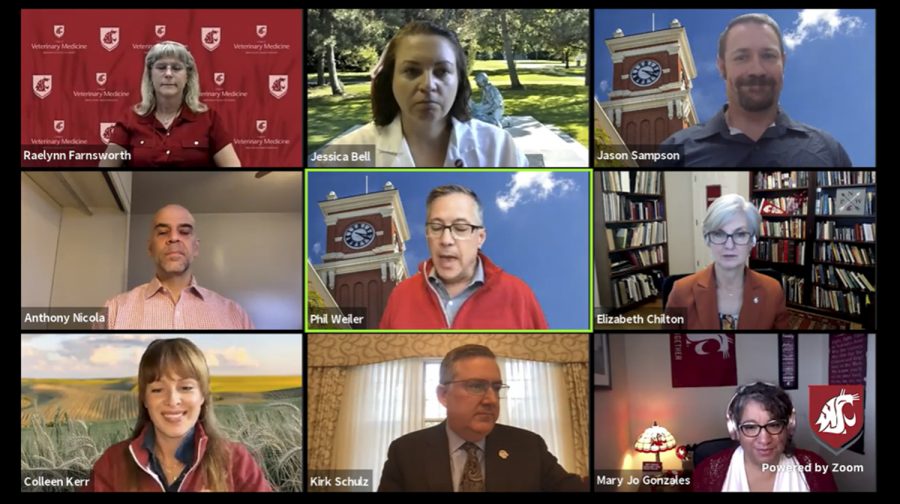WSU to test students arriving on campus, increase housing next semester
Wastewater in buildings on campus will be tested for COVID-19 in spring
Students living on campus, athletes and employees will have to be tested upon arrival in Pullman.
November 19, 2020
WSU officials discussed plans for spring semester COVID-19 testing, housing availability, spring classes and COVID-19 research at a town hall Nov. 18.
Spring semester
The university will implement a testing plan with four components for students returning for the spring, said Colleen Kerr, vice president for external affairs and government relations.
Any student planning on living on campus, as well as athletes and employees, will need to be tested on arrival, Kerr said. Testing will also be available for anyone who believes they have come in contact with someone who tested positive for COVID-19 or are showing symptoms.
WSU will test wastewater from buildings on campus for COVID-19 beginning next semester, Kerr said. If viral activity is found in the water coming from a certain building, people who have been in that building will be asked to get tested.
More single-occupancy dorms will be available next semester for first-year students, said Mary Jo Gonzales, vice president for student affairs. First-year students received emails inviting them to sign housing contracts, which will be open until the first day of classes.
Spring semester classes will be conducted virtually with very few exceptions for in-person classes, WSU Provost Elizabeth Chilton said. There will be slightly more opportunities for in-person interaction, including art studios, agricultural sciences and engineering during the spring semester than there were in the fall.
Spring break will also no longer happen, Chilton said. Instead, WSU will be giving five days off throughout the semester with no class or assignments.
Additionally, the spring semester will begin on Jan. 19, eight days later than was originally planned, which will allow for a staggering move in for residence halls, Chilton said.
Students who head home for Thanksgiving break are urged not to return to campus until the start of the spring semester in January, WSU President Kirk Schulz said.
Research
WSU researchers are conducting a study with pets in COVID-19 positive households, said Dr. Raelynn Farnsworth, College of Veterinary Medicine clinical associate professor.
Farnsworth said she and Dr. Jessica Bell, College of Veterinary Medicine clinical instructor, are trying to see if owners can transmit COVID-19 to their pets.
“We are going to look at maybe what that means as far as transmission,” Farnsworth said.
The WSU College of Veterinary Medicine is studying how COVID-19 can invade cells so researchers can understand how to keep the virus from spreading, said Anthony Nicola, professor of infectious diseases in the College of Veterinary Medicine.
“If we understand how the virus enters the cells, this can lead to new ways to stop infection, and this includes interventions such as antiviral drugs for treatment and vaccines for prevention,” Nicola said.
COVID-19 cases
Whitman County has had fewer COVID-19 cases in the last two weeks with a total of 237 cases, said Jason Sampson, assistant director of environmental services, public health and sustainability.
There have been 79 cases on the Pullman campus in the last two weeks, Sampson said. Most of them are from employees who have been engaging in social gatherings.
More than 8,600 tests have been done so far in Whitman County, Sampson said.
There has been an increase in infection nationwide, and especially with the holiday season, it is important to remember to follow safety protocols with the ongoing pandemic, Schulz said.
“I do just sincerely, sincerely ask that we all be vigilant and do the right thing so that we can all get together with our friends and family next season,” Schulz said.
















